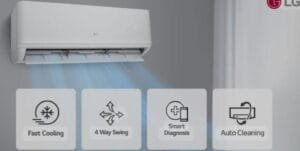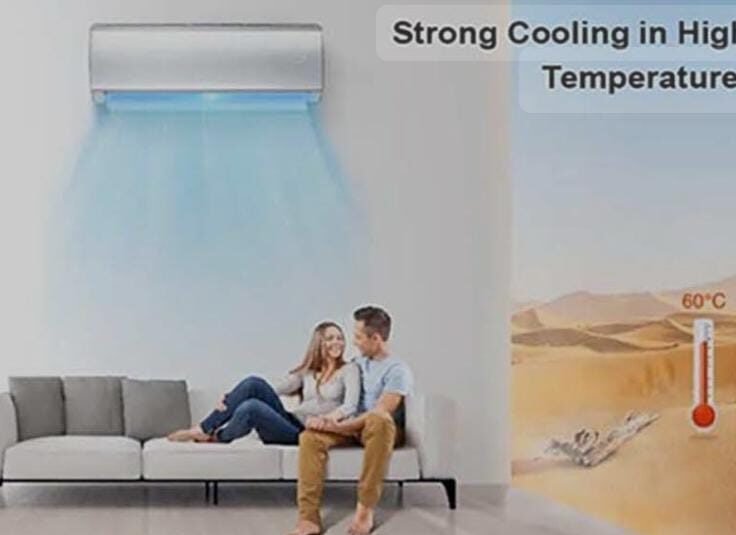what is inverter technology in ac
Air conditioning has become an essential part of modern living, especially in regions with extreme weather conditions. With technological advancements, air conditioning units have undergone significant improvements, and one of the most notable innovations is inverter technology.

The operation of air conditioners has been transformed by this technology, which offers improved durability, improved cooling performance, and improved energy efficiency. In this article, we will explore what inverter technology is, how it works, and why it has become a preferred choice for consumers worldwide.
What is technology behind inverters? Inverter technology refers to the mechanism used to control the speed of the compressor motor in an air conditioning unit.
Traditional air conditioners operate on a fixed-speed compressor, which means they work in a simple on/off cycle. The compressor operates at full power until the desired temperature is reached when the room temperature exceeds the set level. This repetitive starting and stopping not only consumes more energy but also causes wear and tear on the system.
In contrast, inverter technology allows the compressor to run at variable speeds. The compressor responds to the need for cooling by adjusting its speed rather than completely shutting down. When the desired temperature is reached, the inverter compressor continues to run at a lower speed to maintain that temperature. This results in significant energy savings, quieter operation, and increased comfort.
How Inverter Technology Works what is inverter technology in ac
At the core of inverter technology is an electronic inverter that converts alternating current (AC) into direct current (DC), and then back to AC at the desired frequency and voltage. This process allows the compressor motor to operate at variable speeds.
1. Temperature Sensing: The thermostat in the air conditioner detects the room temperature and compares it to the desired setpoint.
2. Signal Processing: Based on the temperature difference, the inverter module calculates how much power is needed to reach or maintain the set temperature.
3. Speed Control: The inverter controls the compressor’s speed by adjusting the electrical frequency it receives.
4. Continuous Operation: The compressor can be turned down or up as needed without completely shutting off. In comparison to non-inverter models, inverter air conditioners are more durable and efficient thanks to their variable-speed operation.
Benefits of the Technology of Inverters
One of the biggest advantages of inverter technology is energy efficiency. The compressor uses less electricity because it doesn’t start and stop all the time. According to studies, inverter air conditioners can save 30% to 50% more energy compared to traditional models. This results in significantly lower electricity costs over time.
2. Improved Temperature
Management Inverter ACs provide more precise temperature control. Since the compressor speed is continuously adjusted, the unit can maintain a consistent room temperature with minimal fluctuations. This leads to improved comfort for the occupants.
3. Quieter Operation
Non-inverter air conditioners’ frequent starting and stopping can result in noise that can be disruptive, particularly in offices or bedrooms. Inverter ACs operate more quietly because the compressor runs continuously at a lower speed when full power is not needed.
4.Increased Lifespan By preventing

the repeated on/off cycles that are common in conventional systems, inverter technology reduces compressor stress. The air conditioner’s lifespan will be extended as a result of less wear and tear.
5. Environmentally Friendly
Because of their energy-efficient operation, inverter air conditioners contribute to a reduction in greenhouse gas emissions. Many inverter ACs also use eco-friendly refrigerants like R32, which have a lower global warming potential compared to older refrigerants.
Applications of Inverter Technology what is inverter technology in ac
Various Uses for Inverter Technology Numerous air conditioners now make extensive use of inverter technology,
including:
Split ACs: Most modern split ACs come with inverter compressors.
Although they are less common, some high-end window air conditioners include inverter technology.
Central HVAC Systems: Inverter-driven compressors are also used in large-scale heating and cooling systems for commercial and industrial applications.
Considerations Before Buying an Inverter ACwhat is inverter technology in ac
While inverter air conditioners offer numerous benefits, there are a few things to consider:
Initial Cost: Inverter ACs are generally more expensive upfront than non-inverter models. However, the energy savings over time often offset the higher initial investment.
Due to their advanced electronics, these units may require more specialized maintenance and repair services.
Voltage Fluctuations: In regions with frequent power fluctuations, it is advisable to use a stabilizer or select models with built-in voltage protection.
Conclusion
Inverter technology has brought a significant transformation to the air conditioning industry by offering a smarter, more efficient, and environmentally responsible way to cool indoor spaces. Its ability to adjust compressor speed based on the cooling load not only results in energy savings but also enhances comfort and system longevity. Although the initial cost may be higher, the long-term benefits of reduced electricity consumption, quiet operation, and better temperature control make inverter air conditioners a wise investment for both residential and commercial users. As the demand for energy-efficient appliances continues to rise, inverter technology is likely to become the standard in air conditioning systems around the world.
